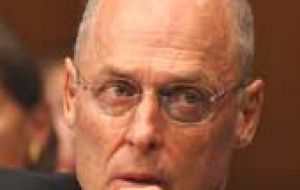MercoPress. South Atlantic News Agency
Fed cuts rates to 2.25% and Paulson denies recession
 US Treasury Secretary Henry Paulson
US Treasury Secretary Henry Paulson The Federal Reserve cut US interest rates sharply (0.75%) in an attempt to restore confidence to nervous financial markets and boost the ailing economy. However the cut was smaller than markets expected and the rate now stands at 2.25% (down from 3%), almost at inflation level.
Earlier in the day US Treasury Secretary Henry Paulson admitted that the US economy was facing a "sharp decline" at the moment, but hoped for a recovery later in the year. Many economists believe the US economy is already in a recession. The Federal Reserve acted aggressively this week in an attempt to avert a financial panic after investment bank Bear Stearns was forced into a fire sale over the weekend to avoid collapse. The firm, one of the top five investment banks in New York was taken over by its larger rival JP Morgan Chase for a fraction of its value. The Fed approved the operation with a strong financial support. The Fed has now lowered rates six times since mid-September, with the economy reeling from the credit crisis that was triggered by a slump in the US housing market. Wall Street rallied earlier after two leading investment banks, Goldman Sachs and Lehman Brothers, reported smaller falls in profits than analysts had been expecting. The Fed is hoping its actions will stave off both a recession in the wider economy and go some way to ease unprecedented conditions in the financial system. As the economy worsens, banks and financial institutions are calling in loans and becoming increasingly reluctant to lend money, particularly to borrowers considered to be high risk. "Today's policy action, combined with those taken earlier, including measures to foster market liquidity, should help to promote moderate growth over time and to mitigate the risks to economic activity. However downside risks to growth remain", pointed out the Fed. Bear Stearns got into trouble when other banks refused to lend it money over fears that it had too many bad debts due to the sub-prime mortgage crisis. The Fed expressed some concern about inflation in the statement that accompanied the interest decision. Analysts said this could signal that an end to the current cycle of rate cut cycle was fast approaching. "Inflation has been elevated, and some indicators of inflation expectations have risen. The Committee expects inflation to moderate in coming quarters, reflecting a projected leveling-out of energy and other commodity prices and an easing of pressures on resource utilization. Still, uncertainty about the inflation outlook has increased. It will be necessary to continue to monitor inflation developments carefully", said the official release from the Fed. Mr Paulson declined to use the word recession to characterize the US economy, but recent polls of both economists and the public have revealed that they disagree. The latest economic figures to suggest a sharp slowdown were the industrial production figures, published on Monday, which fell by 0.5% in February. US job growth was also negative in February, but Mr Paulson said he expected the economic package and further rate cuts to lead to 500,000 more jobs this year. US producer prices, released on Tuesday, rose by 0.3% in February compared to the month before, but a key measure of core inflation at the fastest pace in well over a year. President George Bush came out in support of the Fed in an attempt to reassure investors, accepting that the US economy faced "challenging times" but insisting that the Fed was "on top of the situation". "When need be, we will act decisively, in a way that continues to bring order to the financial markets," he said. "In the long run, our economy is going to be fine", underlined Bush who has one of the lowest public opinion performance rates in decades of an outgoing president. Another significant piece of information from the release is that the Open Market Committee voted divided with two members in favor of a smaller cut in rates. Finally if two quarters running of negative growth is described in the US as a recession, the Fed's description of the current situation almost confirms it: "recent information indicates that the outlook for economic activity has weakened further. Growth in consumer spending has slowed and labor markets have softened. Financial markets remain under considerable stress, and the tightening of credit conditions and the deepening of the housing contraction are likely to weigh on economic growth over the next few quarters".




Top Comments
Disclaimer & comment rulesCommenting for this story is now closed.
If you have a Facebook account, become a fan and comment on our Facebook Page!